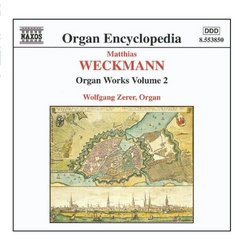A fine artist on a magnificent instrument
Otto Uttenthal | Madrid, Spain | 03/15/2001
(5 out of 5 stars)
"Weckman (he himself spelt it with one n) is increasingly being seen as a central figure in keyboard music of the high baroque period. Boy chorister with Schutz, rival and then lifelong friend of Froberger, he transmitted Frescobaldi's and Froberger's influence to other North German organist composers. This CD completes Wolfgang Zerer's recording of Weckman's chorale variations and other keyboard works on the magnificently restored Arp Schnitger organ of St. Jakobi, Hamburg (where Weckman played on the forerunner of the present instrument). Whereas the organ was disappointing in recordings made before the recent restoration, it now has the authentic Schnitger sound, magnificently exploited by Zerer's registrations, which are faithful to the occasional indications in the manuscript sources and in line with recent scholarship on the subject. Zerer knows how to put across Weckman's angular, rugged virtuoso style - this is not just "stylus phantasticus" but Weckman's own awkward version of it. Weckman was a skilled contrapuntist, but Mozartian grace was not for him; he wrestles with his counterpoint like Beethoven, producing effects of real power. Weckman's Zarlino canons on chorale themes have been controversial. Some consider them to be a scholastic bore, irrelevant to genuine musical expression. Zerer shows that they are not. When attacked with conviction and athletic virtuosity, as Zerer does and as the composer no doubt did, they take us into airy polytonal regions not usually associated with this period, and they make sense. Less successful are Weckman's chromatic slides in certain variations; they left this listener feeling slightly seasick. Weckman stuck close to the chorale tunes and the quality of the cantus firmus influences the artistic outcome. For this reason the otherwise impressive "O lux beata trinitas" variations cannot compete with the "Es ist das Heyl" variations in Volume 1, Weckman's masterpiece (and possibly the most technically demanding organ music before Max Reger). Weckman's decorative figurations have been criticized as being rather pedestrian e.g. compared with Buxtehude's, but they do not hide the chorale melody, and in any case Weckman was not a decorative artist; he was clearly seeking larger scale architectonic effects. Weckman was a very serious, highly dedicated artist, as witnessed by his detailed studies of other composers' works. Zerer's performance does the composer justice. No further praise is necessary. This recording has provided me with many hours of repeated enjoyment."


 Track Listings (22) - Disc #1
Track Listings (22) - Disc #1